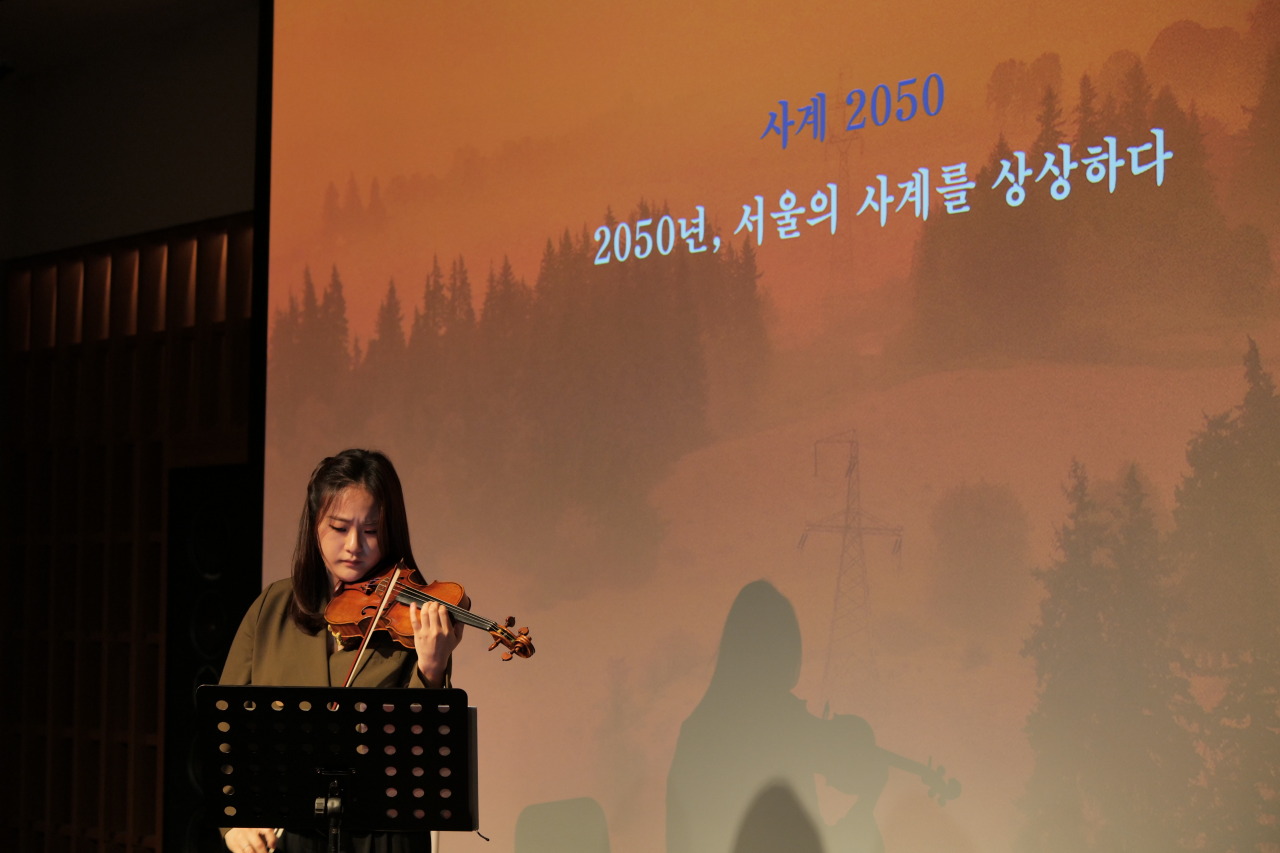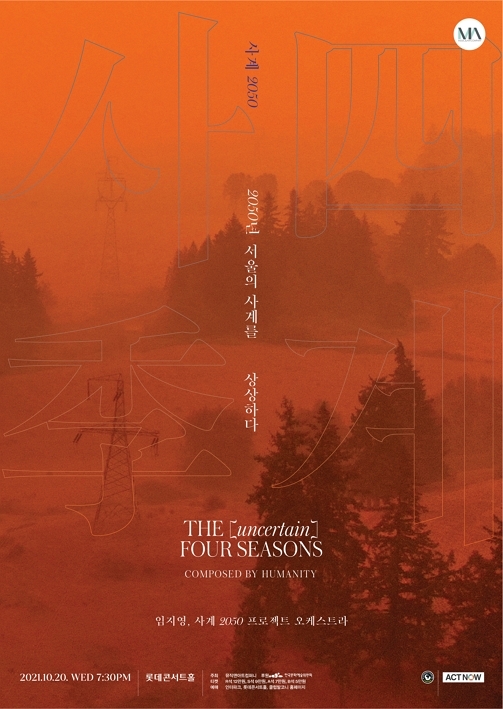 |
Violinist Lim Ji-young performs part of “The (uncertain) Four Seasons” during press conference in Seoul on Tuesday. (Music and Art Company) |
A beloved Antonio Vivaldi piece has been reinterpreted with an AI-twist, imagining and rearranging “The Four Seasons” of the year 2050.
“The (uncertain) Four Seasons,” a global music project calling attention to climate change and the loss biodiversity, will go onstage Oct. 20 at Lotte Concert Hall in Seoul.
Developed by composers, musicians, climate and computer scientists using geospatial climate predictions, the project is an algorithmic rearrangement of Vivaldi’s “Four Seasons.”
A chamber orchestra headed by concertmaster Wayne Lin, with violinist Lim Ji-young playing as a soloist, will perform the Seoul variation of the piece.
A graduate of Korea National University of Arts, Lim won the 2015 Queen Elisabeth Competition at the age of 20. She was recently chosen as “30 Under 30 Asia 2021” by Forbes.
Lin, a Chinese-American violinist, is the associate concertmaster of the Seoul Philharmonic.
“I have always thought that Vivaldi’s pieces are very straight forward and raw, compared to Brahms’ or Beethoven’s,” said Lim during a press conference held in Seoul on Tuesday.
“When I first heard the AI arrangement demo piece, I immediately pressed pause within the first few seconds because it felt so convoluted and unstable. But I began to realize the need to play this piece, in order for the year 2050 not to actually sound like the piece,” Lim said, adding that the AI’s arrangement was “not as beautiful.”
While admitting that it was well written in terms of accuracy in music arrangement skill, Lim said that the chords and the tempo evoked emotions of despair and hopelessness.
Shin Jae-hyun, a machine learning specialist who was the lead scientist for the project, said in a video interview, “The prediction data from ‘CMIP5’ model was used, and as a data scientist, it was very challenging and interesting to be dealing with such a vast data set.”
The Coupled Model Intercomparison Project (CMIP5) is a World Climate Research Program’s collaborative framework designed to improve knowledge of climate change.
“I took part in this global-scale project to think about the role of arts and science in communication of social issues. Using data science to create music was an unforgettable experience,” Shin said.
As climate scientists today have different interpretations and predictions of the future, Shin believes it would be best to keep the conversations going through data being collected.
 |
Poster of “The (uncertain) Four Seasons” (Music and Art Company) |
The global project “The (uncertain) Four Seasons,” is a brainchild of the London-based digital design and communications agency AKQA. Jung von Matt, an advertising agency headquartered in Hamburg, composer Hugh Crosthwaite, the Sydney Symphony Orchestra and the Monash Climate Change Communications Research Hub worked together to rework the original score of Vivaldi’s “The Four Seasons” using the latest climate modelling data from a report that assumes a future narrative when concerted global efforts at mitigating climate change fail.
The arrangement was first performed by the NDR Elbphilharmonie Orchester in 2019. The shocking dissonance of the resulting music with some variations expressed in chords and rhythms, where birds have fallen silent and rivers ceased flowing, evoked fear and awe in the audience.
Since then, the joint global project has been performed in countries around the world, including Germany, Scotland, the Netherlands, Australia, Kenya, Canada and Brazil. Each city’s variation differs by longitude and latitude along with accumulated climate data.
Seoul is the first Asian country taking part in the project.
After the Seoul variation, the project is expected to be performed in Scotland at next month’s 2021 United Nations Climate Change Conference (COP26).
Participating organizations will be performing different cities’ variations online in a relay-format, to mark the opening of the COP26s, starting in the evening of Oct. 31, Korean Standard Time. The Seoul variation is likely to be performed on Nov.1, according to Korean organizers, Music and Art Company.
By Kim Hae-yeon (
hykim@heraldcorp.com)








![[Weekender] Korea's traditional sauce culture gains global recognition](http://res.heraldm.com/phpwas/restmb_idxmake.php?idx=644&simg=/content/image/2024/11/21/20241121050153_0.jpg)
